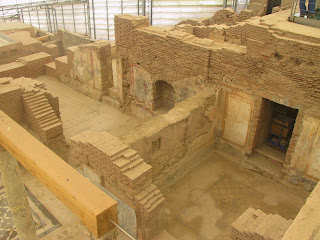Walking on water in liquid time
ankles, toes, shanks immersed
but not quite sinking, yet:
Can we learn to walk on water?
ankles, toes, shanks immersed
but not quite sinking, yet:
Can we learn to walk on water?
Can we learn today when things are fluid
to live in the in-between
of large shores of history, culture
to live in the in-between
of large shores of history, culture
of old and new ways of doing things.
In between modern and postmodern
in midst of change, on cusp of change
In between modern and postmodern
in midst of change, on cusp of change
do we have to walk on water
or is it optional?
or is it optional?
Are we just showing off?
is it a party trick?
- What could this skill possibly
be in aid of?
- What could this skill possibly
be in aid of?
Have we been thrown - or fallen overboard
and we need now just to learn
how to do this impossible task
'cause we’ll drown otherwise?
Because we cannot walk on water
we can’t even swim, perhaps
least, not as far as we need to, we must
- can we?
Is it faith or folly or fate
are we tempting providence?
Is Jesus calling us to, wanting us to, waiting
to teach us, help us, lift us?
to teach us, help us, lift us?
If you want to walk on water, you’ve got to get out of the boat
- but am I, is our whole society
already ‘out of the boat'
rightly or wrongly having left all known?
All safety gone, the past, the known
like Peter, did we leave our fishing?
- the basic tools for doing, being,
behaving, left behind?
Must we leave our boats to reach the Kingdom?
to enter and share God's Way of seeing
to enter and share God's Way of seeing
things whole in all
He's made, re-made on Heaven and earth?
He's made, re-made on Heaven and earth?
Are we swimming, drowning
or still in the boat
when we might be walking nearer
to the Kingdom ?
What is 'Liquid,' anyway?
what its beauties?
Like that TV paint commercial
bright, beautiful, mesmorizing
a stream, a lake, an ocean
constantly changing, ebbing, swelling.
There's a certain thrill in being
‘over our head’
Like that TV paint commercial
bright, beautiful, mesmorizing
a stream, a lake, an ocean
constantly changing, ebbing, swelling.
There's a certain thrill in being
‘over our head’
in some extreme adventure
- and doing the impossible.
- and doing the impossible.
What are the dangers of 'Liquid'
if on stormy Galilee
or going with every day's flow?
- drowning, doubting, daring.
How to survive these liquid times
or make progress in such swells or calm?
What on earth - what Spirit possessed Peter
- possesses us, to want
to walk on water for a while, at least
to get out of the boat
and strike out towards Jesus?
Is it possible yet really not sustainable
for Christians to walk on water
do perhaps more
do perhaps more
for all who discover true humanity?
Or could faith be such -
so true in being and such in action
that we could do it more,
maybe longer?
Is Jesus hoping we’ll at least try
and understanding if/when we fail?
maybe longer?
Is Jesus hoping we’ll at least try
and understanding if/when we fail?
since were' living now, contemporaries
in such liquid times?
Is there not a watery middle-‘ground’
some ‘sea’ to cross? - to walk on
between old ‘land masses’
in such liquid times?
Is there not a watery middle-‘ground’
some ‘sea’ to cross? - to walk on
between old ‘land masses’
striding on, in liquid times?
between times
of governments old and new
old economies and new economies
old and new wine and winekins.
between
old and new healthcare systems
a life with a spouse and life after his/her death
between ‘green’ living and economic realities?
old economies and new economies
old and new wine and winekins.
between
old and new healthcare systems
a life with a spouse and life after his/her death
between ‘green’ living and economic realities?
living between
the time when we can accept
or ever come to terms with
the death of parent, child or friend.
Between befores and afters
of friendship strain and reconnection
walking, swimming, drowning
between the befores and afters.
between the befores and afters.
Life between, before
the not yet of acceptance of the theft,
the accident, the incident
between before and after visits to third-world slums.
between before and after visits to third-world slums.
Drowning between the loss of the old,
the purchase of the new
living between businesses, careers
selling the farm to buy the treasure
living in liquid times . . .
living in liquid times . . .





